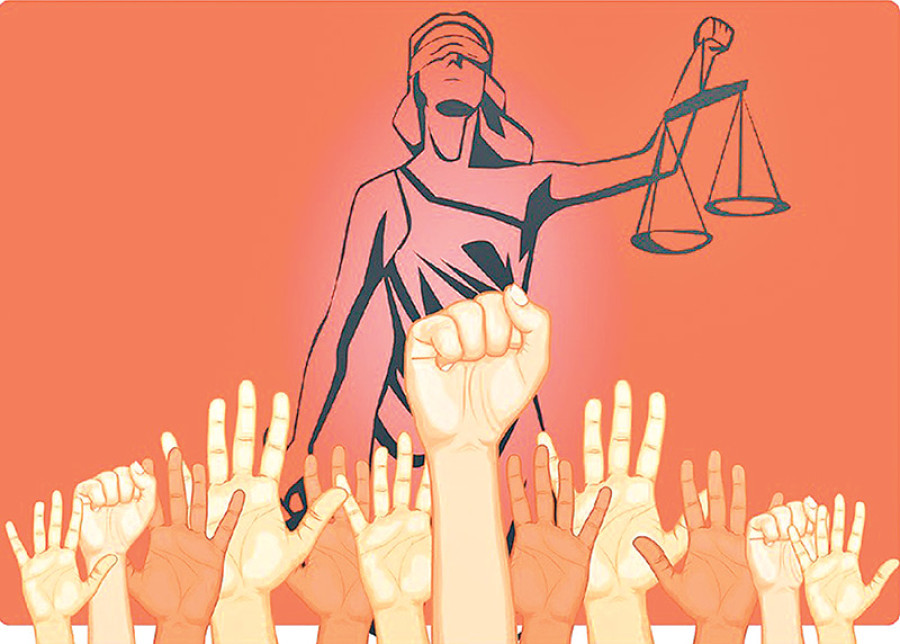Opinion
Sanctity of judiciary
Criticism should aim at strengthening the judiciary through reform, not at weakening it
Barun Ghimire
The wave of allegations and counter allegations that started with the registration of an impeachment motion against the then Chief Justice Sushila Karki has outlived the motion and is now creating turbulence within Nepal’s legal fraternity. Issues concerning the judiciary have been a regular feature in the news lately, and not for the right reasons. All concerned parties should bear in mind that this media episode will only diminish the sanctity of the judiciary in the long run.
Like all other state institutions, the judiciary is not immune from valid criticism either. However, the ‘why’ and ‘how’ of the criticism is of serious concern due to the judiciary’s role as an institution upholding justice and as the guardian of the constitution. Thus, unfounded criticisms levelled at the judiciary may amount to the punishable offense of contempt of the court. Valid criticism must aim at strengthening the judiciary through reform, not at weakening it. Similarly, the criticism related to the judicial system and related aspects must be presented properly without undermining the independence, integrity, impartiality and broader sanctity of the judiciary.
Reform is needed
The judiciary has often been criticised for issues such as political influence in the appointment of judges, corruption, backlog of cases, lack of enforcement of judicial decisions, problems regarding inclusiveness, absence of cost effectiveness, inadequate access to justice concerns, etc. Reform is needed. However, these issues need more than media coverage for substantive change. I am not against healthy criticism directed at the judiciary, but criticism that merely answers questions won’t yield positive results.
The judiciary does need reform in various areas to strengthen its structural and functional aspects. This requires an integrated effort aimed at addressing the causes rather than the effects. At present we are engrossed in dealing with the effects such as political interference, the motion of impeachment, bar-bench relationship, etc. We should focus more on the causes and aim at institutionalising the values of an independent, impartial and competent judiciary.
Shallow criticisms of the judicial system and blame games among actors in the legal fraternity will not strengthen the judiciary in any way. Efforts to strengthen the judiciary must go beyond personal allegations. In particular, those holding public positions need to be thoughtful about how their criticism will impact the public perception of the judiciary.
Public opinion
How the general public perceives the judicial institutions of the country is an important aspect of governance and the rule of law. Public trust in the legal system is a pre-requisite for the observance of the rule of law. Significant criticisms of the judiciary, allegations of political influence, alleged malpractice of attorneys, etc that surface in the media diminish public trust in judicial institutions. This plays out negatively in the long run as it raises questions about the sanctity, integrity and independence of the judiciary. Thus, while expressing discontent with the judiciary regarding particular issues, the public impact of this criticism must also be considered.
The public ought to have information about the judiciary, but the facts must be true. Allegations must be accurate and they must not diminish the integrity of the judiciary and legal system. Those involved in legal institutions in various capacities have a responsibility to maintain the sanctity of the judiciary and accord respect to agencies and office bearers while expressing themselves in public. How information relating to institutions such as the judiciary can be appropriately addressed must be carefully crafted to ensure that it does not have a negative impact on the institution itself.
Silence not an answer
Every citizen has a right to information about how state organs are functioning. In particular, the judiciary as a guardian of the constitution and protector of the rights of citizens needs to be on its best behaviour. There is a need for broader discussion to understand the concerns faced by the judiciary.
In particular, academicians, activists, and others who enjoy credibility among the public must think of the ‘why’ and ‘how’ behind their opinions while expressing their thou-ghts regarding the judiciary. A mere comment from a credible public figure may inflict more harm than good to the judiciary.
In closing, an independent, impartial and competent judiciary is part of the foundational values as envisioned by the constitution. Judicial institutions of any state must be respected, and their integrity and sanctity must be maintained. The judiciary and judicial institutions are not immune from valid criticism that, when addressed, will ultimately strengthen the state. However, dissatisfaction or discontent must be expressed in such a way that reduces its prospective harm to the judiciary, as the judiciary is closely tied with public trust.
Ghimire is an advocate and teaches human rights law




 9.7°C Kathmandu
9.7°C Kathmandu










